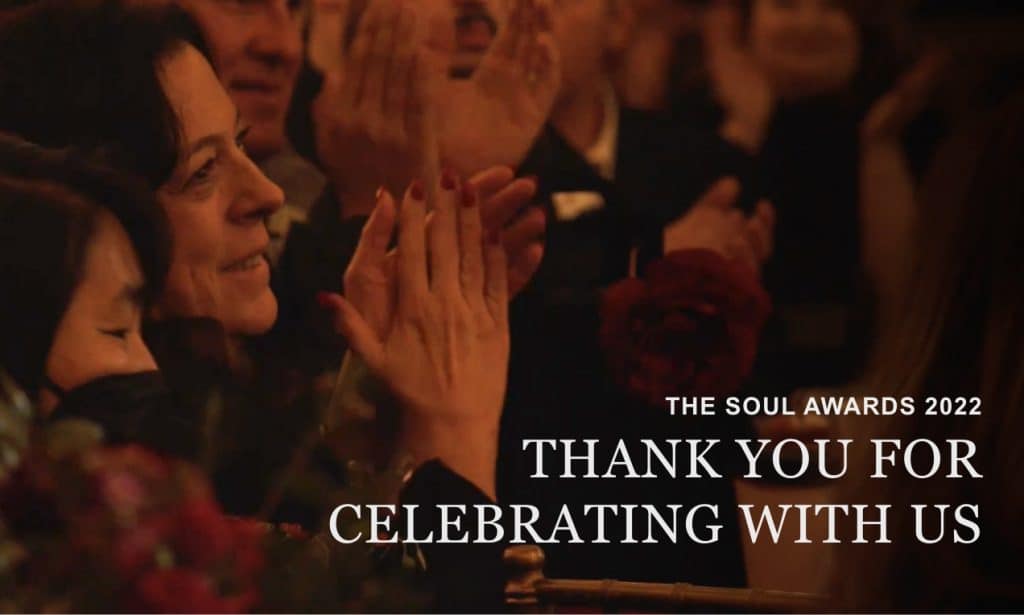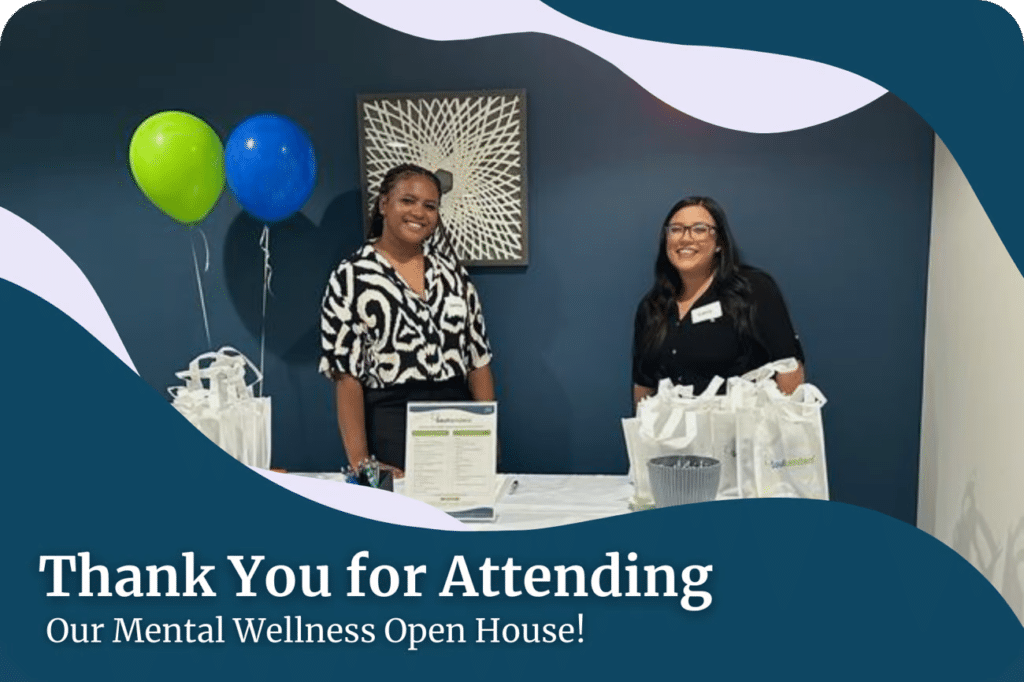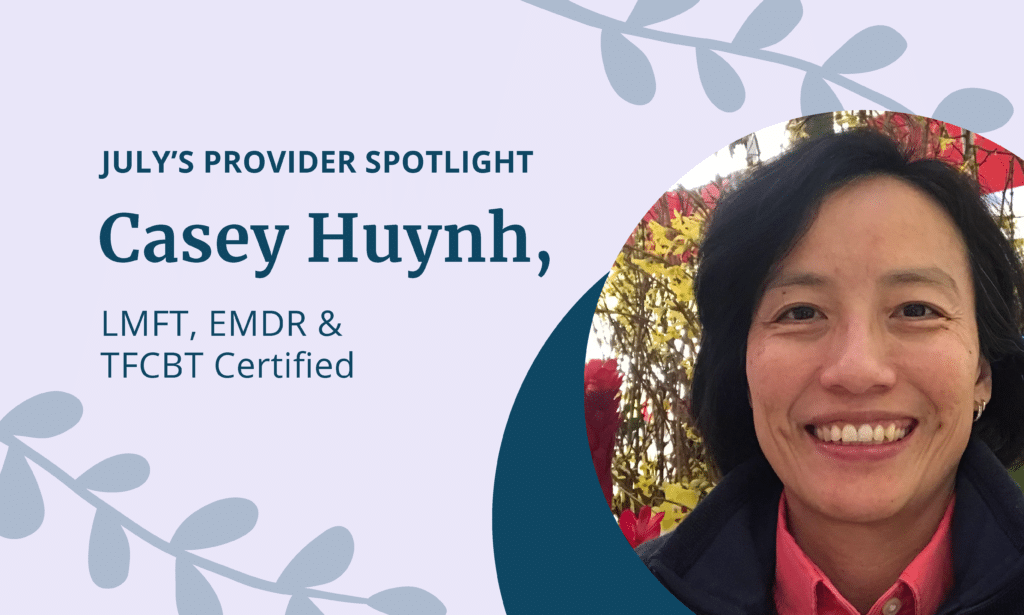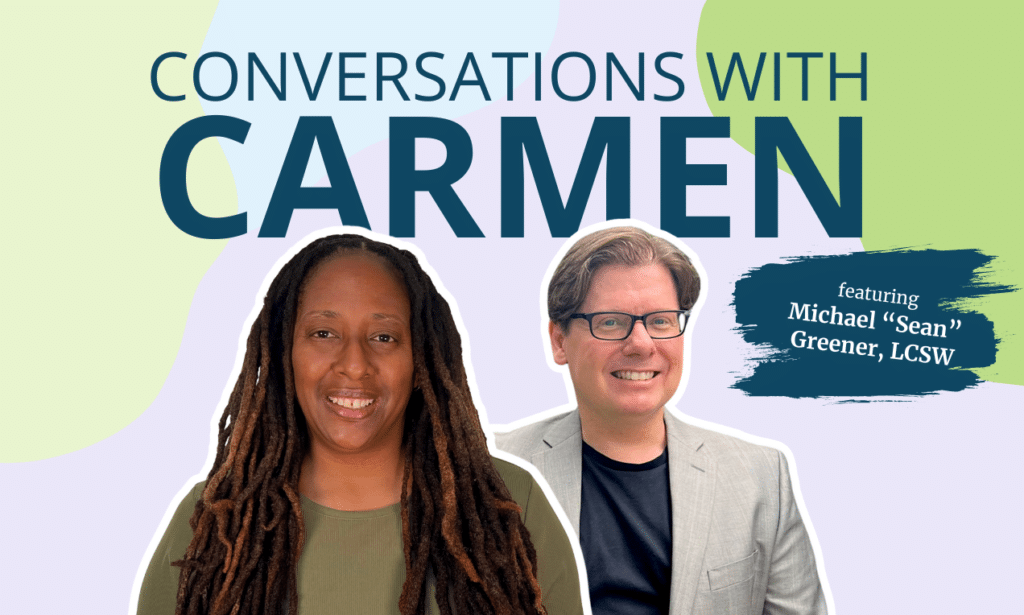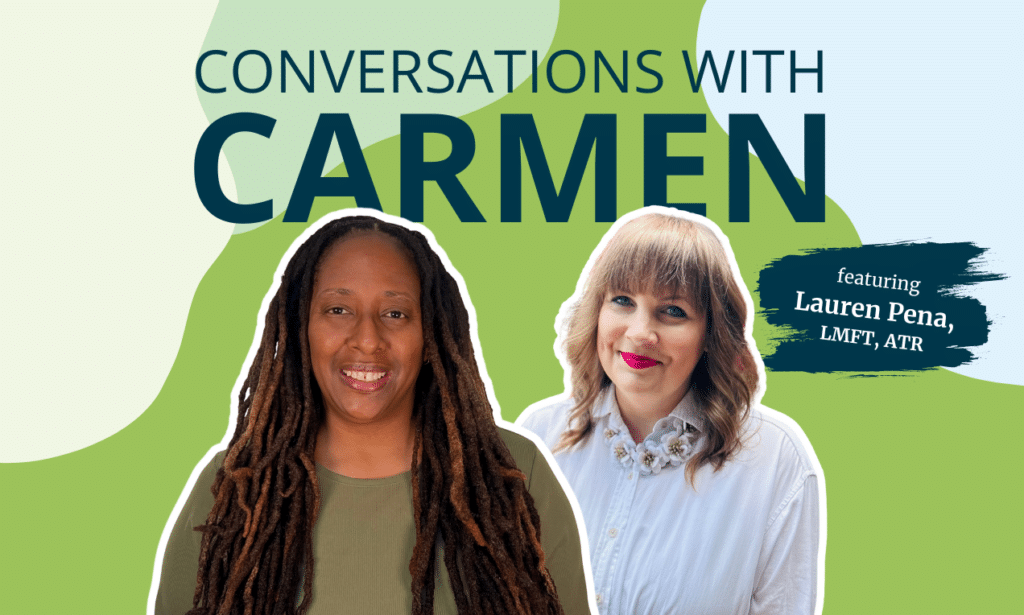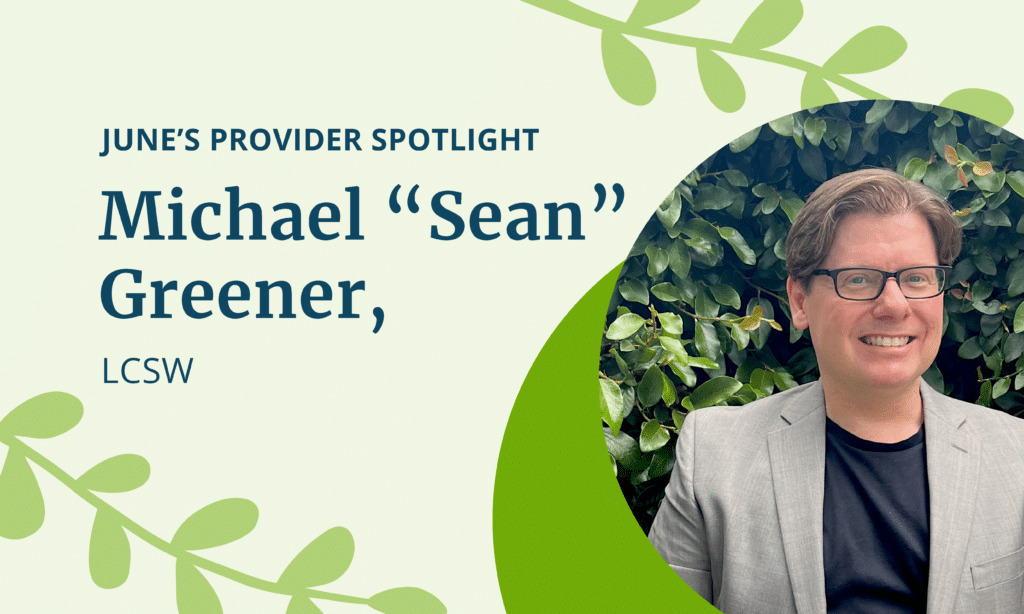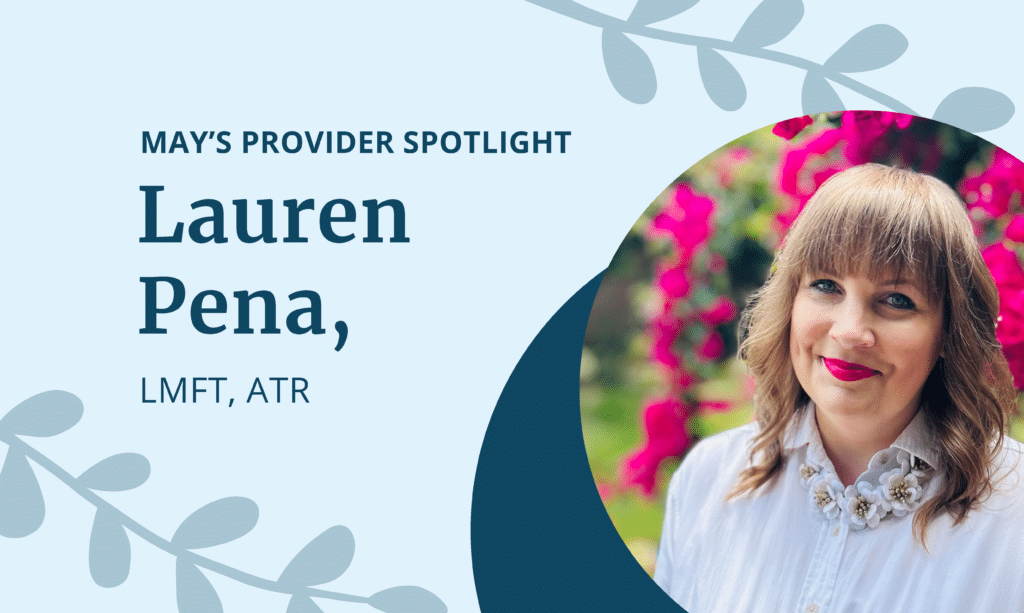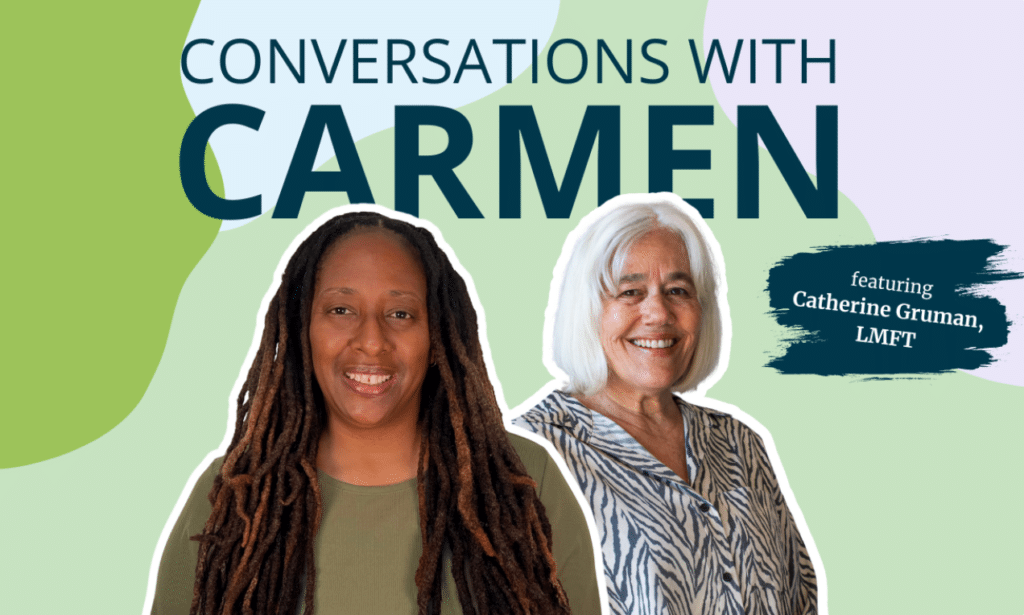
Every month we highlight a provider as our Provider Spotlight. This month’s Provider Spotlight was Therapist, LMFT. Each Provider Spotlight is interviewed by Dr. Carmen Majied for a segment called Conversations with Carmen.
In this segment, Carmen and Catherine discuss Catherine’s journey through life and how she arrived at Private Practice.
You shared that you and your family relocated to California (from Washington, D.C.) when you were two years old. Do you recall anything about that journey? Any notable takeaways?
I don’t remember anything during that journey; We left DC when I was an infant, and stopped in Sequin, Texas for a couple years and landed in Southern California when I was between 2-3.
What was high school like for you? Were you involved in school clubs or other activities? What were your thoughts about career/professional aspirations at that time?
HS was fun. Although I was an underachiever getting Cs and B’s, I had no clue about how to prepare for college. I think a lot of that had to do with confidence and a lack of modeling and coaching. I was friendly in the mileu of HS, but not social; I was a bit intimidated by the groups – I didn’t drink or go to parties. Although, I was voted as ‘Most Friendly’ in the Sr. Year Book, lol. In my senior year, I became a Song Leader, a dancing version of a cheerleader. That was a blast. I was not in sports , but very active, playing tennis, hiking, bicycling, swimming. I had two specific best friends in HS.
You shared that you obtained your Bachelors degree subsequent to raising your two sons. You also mentioned that your initial career was in the Human Resources/recruiting industry. What led you there?
I got a temp job in an HR dept and I loved it. I was HR Assistant, then I progressed to a HR Administrator after obtaining a BS degree and a HR certificate. I was told I needed a Bachelors degree to progress; so, that prompted me to finish my undergraduate studies. After doing so, I moved on to the role of Corporate Recruiter (which I loved). It gave me a space and platform to get to know people’s personalities, strengths, talents, ambitions, inspirations, experiences. It was a much more in-depth connection.
How long were you a HR/recruiting professional before you determined that you “… wanted to connect to people… needed something deeper”?
I think subconsciously the first couple years, after realizing HR is not an emotionally safe setting to connect with people (employees). I’ve always had the heart to connect on an emotional level and I realized I felt stifled a couple years in to the role. Events that followed a few years later helped connect me to my more authentic self and talents- my true self as a therapist.
You mentioned that you participated in personal therapy for the first time at the age of 21. How did your positive experience with your therapist at the time inspire or influence you to pursue a career as a helping professional?
I was impressed and affected by her welcoming spirit, the safe space she created for me to connect with myself, discover aspects of myself and share experiences. This sparked an interest for me to do the same for others. I connected to my calling so to speak.
After realizing that pursuing a career as a therapist was of interest to you, self-confidence was a factor that you temporarily grappled with.. it sounds like it was an initial barrier to launching forward with a sense of self-efficacy. Can you share a bit about that journey?
Absolutely. I realized later that I didn’t think I was smart enough; and I had trouble with studying and focusing, so the structure of college was very overwhelming. I didn’t get reinforcement or admiration for who I was, I was more protected from myself, or avoidant (to be honest) – so, it makes sense that I developed a low sense of self. However, the beautiful thing was that the struggle made me rebellious with a sense of curiosity and determination. I’ve always been searching for the prize of who I am. It was a very rocky road, but here I am. Yay.
You shared that you attended graduate school out of state (specifically, North Carolina) when your sons were young adults. What was that experience like? What did you enjoy most (and least) about it?
The first thing is: although my sons gave me their blessings to go and thought I should go after what I wanted it was hard to be away from them for 4 years (with minimal visits throughout the year). The experience in Boone, NC, was amazing. Living in The Appalachian Mountains, alongside the Blue Ridge Parkway, is an incredibly beautiful experience. Observing all of the seasons was amazing. I think I liked the snow and rain the best. I enjoyed learning the MFT program. I would highly recommend it to anyone- unless you’re into the big school system. I enjoyed being in an environment of community. Most of the professors were great, experiential, humanistic and had an existential learning/teaching style. I’m grateful that we (as students) weren’t pushed in a linear direction of how to do this or that. Instead, the educators empowered us with proper information; yet they also encouraged us to be ourselves (in our respective practices). I also enjoyed being in a different culture, the cuisine, the people, the quirks and the overall friendliness. I definitely made some good friends and had some great laughs.
It was difficult at times being an older person in the cohort. Sometimes I clashed with people here and there. But looking back, I think they were having mommy issues (ha ha).. There were a couple of people who enjoyed telling me how much they hated California. Those insignificant things were probably what I liked least.
As far as your previous internship experience is concerned, you mentioned that you worked with chronically mentally ill and substance abuse clients (mostly in an inpatient setting). What were some notable takeaways?
In the mental health clinic, which was an outpatient program in NC for clients suffering from serious mental illness, there were doctors on site. There was a sense of harmony and support among staff at all levels and I feel like I learned a lot. In working with patients, particularly with the chronically mentally ill population (in NC), I gained a ton of empathy and compassion. I learned how to ‘be’ with the clients in their essence and extend them acceptance. It was also touching to recognize the gratitude they had for being able to visit the clinic for treatment services. I think because I was working in mental health, I learned more about being a therapist, not just how to survive a system.
After transitioning back to California, I worked in the substance abuse/ inpatient programs to get re-licensed here in CA. (I was initially licensed NC). Working within that venue felt chaotic and stressful; there were so many levels of expertise and disciplines (all valuable) co-existing all at once. People were trying to work together while drawing upon their own perspectives and experiences in life and training in an effort to ultimately help clients going through detox. Ultimately, we were preparing clients for discharge (which included encouraging them to imagine a sober life). I think the disconnection between staff and therapists confuses the patient. And it’s disempowering to those same treatment providers. This is my perspective and experience. If you talk to a recovered addict or alcoholic who has dedicated their life to SA treatment, they probably have a different experience and perspective altogether.
Through it all, I still developed friendships and appreciated my supervisors who were focused on client care and supporting me in my work as a therapist.
After obtaining your MFT license in 2016, you became a part of the Soultenders Provider Network in 2017. What was transition like from employee-based work to private practice? Do you distinguish between independent contractor and private practitioner/business owner? If so, in what ways?
The transition felt exciting and I felt a huge sense of relief and freedom. I was mentally and emotionally exhausted from the substance abuse treatment environment and I was ready to be the kind therapist I wanted and still want to be. It took me about a year to calm down and not be worried about doing something wrong- which has never happened. I realized it was a fear of mine that was most likely a carryover from the employee/employer work environment.
How does Soultenders support your growth and development as a practice owner?
Soultenders lets me be me. They accept me for the therapist that I am. They support me in ways that help me be the best therapist I can be. They want me to be happy. Not only does Soultenders handle all of the insurance headaches they provide a practice setting and structure through the use of administrative staff, various office locations and electronic health records – this allows me to focus on client care. I know how to be a therapist and Soultenders management allows me to do that. I am so grateful for their passion to make things easier. I really sense Soultenders’ commitment to empowering me in my practice as a private practitioner to gift the best care I can for my clients ethically, legally, and therapeutically. Also, Soultenders’ methods of building community and harmony among their private practitioners is phenomenal. Coming from a corporate setting (for many years), I truly and greatly appreciate this.
You shared that you see adults and (most recently) couples in your practice. What inspired you to start working with couples? Was there an initial hesitation to do so? If so, how did you navigate that?
I think my block with working with couples involved putting pressure on myself to somehow be a guru or something- to be amazing at it. The thought of working with couples was intimidating, so, I told myself, “I don’t work with couples.” I believed my story. Also, I think since I divorced at a young age, was a single parent and (during that period of my life) chose bad/unhealthy relationships, I learned that I’m better by myself. I developed this lack of care/interest in terms of whether couples stay together or not. It’s kind of like I said to myself: “what would my purpose be working with couples”? But at some point, I became curious and wanted to mix up my population from only working adult individuals. Once I developed the courage I went for it. Also, something Maureen said: “they have to figure it out”, took a HUGE weight off of my distorted view that I have to figure it out (for them). I reminded myself that what Maureen said is actually reflective of my approach with individual clients- and I’m confident in that- so, I came to the understanding that couples are no different.
You are EMDR trained and certified. How you do integrate EMDR into your practice? How has recently becoming an EMDR consultant impacted your career and professional identity?
EMDR has enhanced my practice tremendously. Before being trained in EMDR I don’t believe I realized what trauma really was and how it potentially affects people. I’m now able to identify symptoms and behaviors of trauma and offer EMDR as a treatment. As each target memory is addressed utilizing EMDR techniques, clients slowly develop and strengthen positive beliefs about themselves and it organically informs their treatment moving forward.
Since becoming an EMDR consultant-in-training, I have a deeper recognition of my expertise and experience and I’ve become more confident. It’s a healing experience for me to look back on all that I’ve accomplished and realize that I am where I never thought I would be (thinking way back in time). I’m hopeful that I can grow this aspect of my career and balance it with continuing to provide therapy for years to come.
You shared that a few items on your ‘professional bucket list’ are:
* to complete two children’s books (short stories)
I started these stories years ago and consequently, I’ve gained more experience and insight since then; so I’d like to pull them out of the box and edit with a newness of insight and relativity. I need an illustrator, though.
* to grow your EMDR consulting niche
I am looking forward to becoming credentialed as an EMDRIA consultant in order to encourage and support peers on their journeys toward EMDR certification. I want to help maintain and support the practice and integrity of EMDR and continue building up and contributing to the community.
* to work towards becoming an ADHD coach
Having ADHD myself and recognizing the hurdles in my own life, I have a good understanding of ADHD; but I don’t yet have a thorough, disciplined training to help my clients in the best way possible. There is such a need for ADHD treatment. I fortunately came across the opportunity to be an ADHD coach. It sounds really fun.
Can you briefly elaborate on each of these professional goals? See listed above
Can you please elaborate on your respective roles as Provider Experience Specialist and ‘Good Vibes Gathering: Share, Inspire, Grow’ facilitator?
PES–Soultenders reached out to me and offered me the role of PES (I think almost 2 years ago now). In this role, I reach out to new providers, welcome them to the network and follow up on a monthly basis. During the first three months, I check in with them, reinforce resources as well as direct them to the appropriate group for any questions they may have. Sometimes I can answer them myself; but for the most part they have their PSS (Provider Support Specialist), ongoing support from colleagues and Provider Relations for help as well.
Good Vibes Gathering channel – Soultenders asked if I would do this because they noticed a text I wrote one day and all of the responses and positive interactions among the team. So, I drop a prompt about once a week to incite and inspire conversation around that prompt. It’s meant to build each other up and extend/share community and support.
During our initial conversation, you shared with me the following: “I come from a place of not knowing… I think that’s very powerful”.
What does this mean to you?
As therapists, of course we know stuff. We know how to be therapists legally, ethically and therapeutically.
But more deeply, if I come from a place of not knowing, I can be curious, unbiased, accepting and empathetic. If I think I know what the client needs and wants I’m creating my story, rather than allowing them to create and discover their own story. This is for all clients- individual, couples, LGBTQI and people of color. If I come from a place of not knowing I can have a heart of learning so that I can be more apt to offer help as their therapist. It allows me to step back and ask questions and notice differences. I believe this empowers the client and builds trust. With couples, if I come from a place of not knowing, I can hold hope for couples instead of transferring or projecting my own failed relationship experiences on them. An interesting domain is spirituality and religion. As a previous Christian (no longer practicing), I connect to the idea that rather than judge my clients who are religious I can rest in their presence and allow them to embrace their beliefs for comfort and resourcing. If I come from a place of not knowing I can BE with THEM and not project myself onto them.
16. What are your hobbies/interests? How do you decompress?
Turning off my computer, walking, doing floor exercises, yoga, watching movies, listening to music and spending quality time with an individual friend or family member are things I love to do. Having loving, introspective conversations while sitting on the floor with my grand kids is also amazing. I also love taking road trips, hitting the road (impromptu), stopping for snacks, listening to music or podcasts, seeing the sites, drinking coffee – alone or with someone. I like myself enough to do things on my own; I kind of like the adventure.

